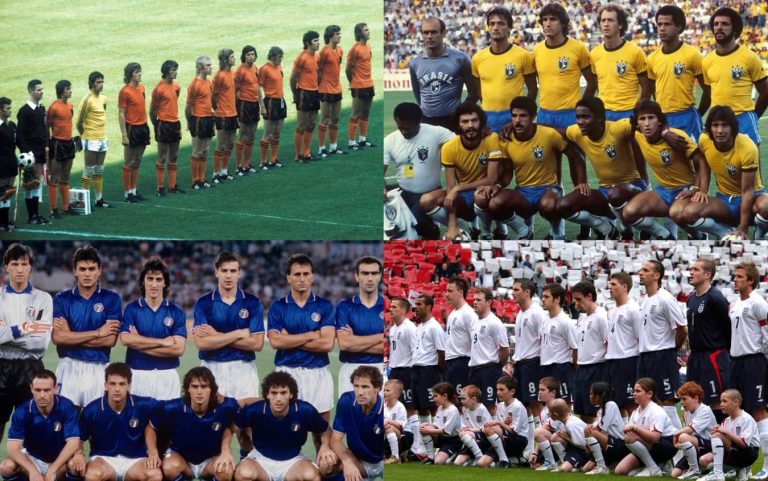Predictions
Home » Top 10 Strongest National Football Teams in World Cup History
Top 10 Strongest National Football Teams in World Cup History

The next World Cup is just around the corner, scheduled to take place on the American continent in the summer of 2026. As football enthusiasts eagerly anticipate this event, it’s worth noting that it will be the 23rd edition in history, setting the stage for the centenary celebration in 2030.
While achieving a unanimous consensus on this topic may be a challenging endeavor, we have taken it upon ourselves to select and rank the 10 strongest national teams in the history of the World Cup.
- Hungary – 1954
In 1954, the World Cup was held in Switzerland, and it showcased one of the most formidable Hungarian teams ever seen. Led by the legendary Ferenc Puskás, this squad proved to be a force to be reckoned with. However, despite their incredible prowess, they suffered a heartbreaking loss in the Battle of Bern against Brazil and the Miracle of Bern, which ultimately marked the end of the Magyars’ era. Their undefeated streak of four years came to an end, denying them a sensational World Cup triumph.
- Brazil – 1958
The birth of Brazil’s World Cup myth can arguably be traced back to 1958. A young Pelé emerged as the star player who exorcised the demons of Brazil’s shocking defeat at home eight years prior. Alongside Vavá and Didí, Pelé shone brightly in Sweden, scoring in every match of the direct elimination phase.
- Brazil – 1970
Twelve years later, Brazil boasted even more talent. With Pelé leading the charge, the team included players like Gerson, Jairzinho, Rivelino, and Tostão. The Seleção dominated their group and outperformed everyone in the knockout phase, culminating in a victory over Italy in the final. It was the reign of O Rei, with Brazil winning their third World Cup in the previous four editions.
- Germany – 1974
The World Cup in 1974 raised the bar even higher, and some consider the German team of that year to be the strongest in history. Their claim to fame was defeating Johan Cruyff’s Holland. The squad featured talents like Breitner, Sepp Maier in goal, Uli Hoeness, Gerd Müller, and, most notably, Franz Beckenbauer, who lifted the Cup.
- Holland – 1974
The Netherlands significantly influenced modern football for both club and national teams, despite their inability to secure a World Cup victory. In the 1970s and 1980s, they reached two World Cup Finals but were unable to clinch the title. The first of these finals, in 1974, featured Johan Cruyff as their shining star.
- Argentina – 1986
The year 1986 marked the emergence of Diego Armando Maradona as the defining figure of the Argentina national team. Argentina had already triumphed eight years earlier, but Maradona’s incredible talent made him the face of the national team.
- France – 1998-00
Generations of young football fans have grown up with the notion of France being among the world’s strongest national teams. This reputation, however, primarily applies to the 21st century. In 1998, France became World Champions by defeating Ronaldo’s Brazil, and they repeated this feat two year later by winning the European Championship in a final against Italy.
- Spain – 2008-12
Many consider the Spain of 2008-2012 to be the strongest national team in history. Under the guidance of managers like Luis Aragonés and Vicente del Bosque, Spain secured two European Championships (in 2008 and 2012) and a World Cup victory in 2010. Their playing style, a perfect blend of Real Madrid and Barcelona, mirrored the strengths of the two strongest club teams in the world at the time.
- Germany – 2014
The 2014 World Cup will forever be etched in memory, especially for Brazil fans who experienced the humiliating defeat known as the “Mineirazo.” Germany, led by Joachim Löw, clinched a well-deserved victory against Lionel Messi’s Argentina in the final.
- Argentina – 2022
In a historic turn of events, Lionel Messi finally secured a World Cup victory, a feat many believed he needed to reach the level of Diego Maradona or surpass Cristiano Ronaldo. Messi’s remarkable performance in Qatar, characterized by goals, assists, and breathtaking plays, carried Argentina to victory after 36 years of longing.
As we eagerly await the upcoming World Cup in 2026, these 10 national teams stand as testaments to the rich history and legacy of the tournament, each contributing their unique chapters to the story of the World Cup.





